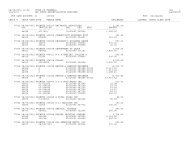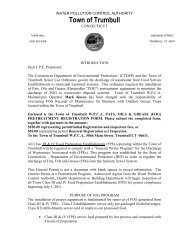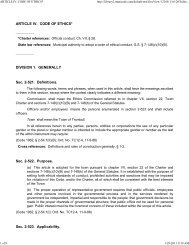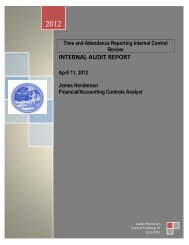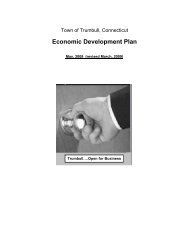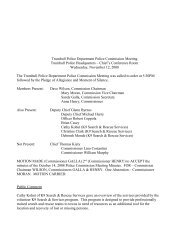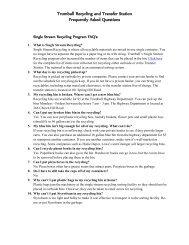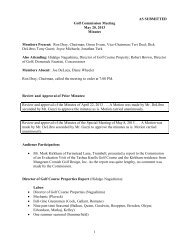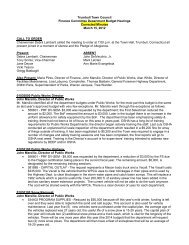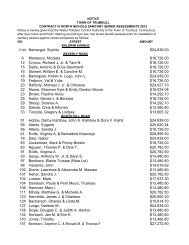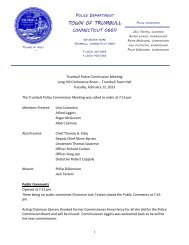Forensic Audit Report-WPCA Phase IV, Part B. Contract ... - Trumbull
Forensic Audit Report-WPCA Phase IV, Part B. Contract ... - Trumbull
Forensic Audit Report-WPCA Phase IV, Part B. Contract ... - Trumbull
Create successful ePaper yourself
Turn your PDF publications into a flip-book with our unique Google optimized e-Paper software.
<strong>Forensic</strong> Consulting Services <strong>Report</strong><br />
Town of <strong>Trumbull</strong>, Connecticut<br />
Page 36<br />
with any change orders. Many changes orders were approved without much, if any, questioning.<br />
Certain change orders were questioned by the <strong>WPCA</strong>. There is additional discussion related to<br />
specific change orders elsewhere in this report. In total, pay apps were approved and paid in excess<br />
of approvals by the <strong>WPCA</strong>, Finance Committee and Town Council in the amount of approximately<br />
$120,000 (see Exhibit G).<br />
In addition, while testing the mathematical accuracy of the pay apps, we found a number of errors.<br />
Some of the errors were corrected in subsequent pay apps and other errors did not result in<br />
overpayments to the vendor, they just involved incorrect percentage completion figures.<br />
Construction Related Change Orders<br />
A review of the change orders processed and approved by the <strong>WPCA</strong> indicates a general lacking of<br />
documentation and accountability to track and support the changes that were made, an<br />
overwhelming reliance on lower level and inexperienced employees of the Town with little, if any,<br />
guidance and/or oversight regarding such matters, little if any negotiation of scope and cost with the<br />
contractor, a poorly administered protocol for approving the changes, limited considerations for the<br />
financial burdens being accepted, and a total lack of formal contract documents being properly<br />
prepared and executed by the appropriate parties amending the original <strong>Contract</strong>.<br />
One must recognize that the change order process is indeed a contractual, legal amendment to the<br />
<strong>Contract</strong> as originally executed. Change orders are typically required to modify the original<br />
<strong>Contract</strong> in any way shape of form. This includes increasing, decreasing and/or modifying the basic<br />
scope or elements of the work, adding elements of work covered by the “Supplementary Unit<br />
Prices”, adding “extra work” outside the parameters of the original scope, time adjustments for<br />
completing the contract work, and any modifications to the overall project cost. As such it is<br />
important to administer each and every change order as a complete, well documented, properly<br />
approved, stand alone supplement to that original <strong>Contract</strong>. Based on the available records and<br />
interviews with Town employees, this was not the case for <strong>Contract</strong> 3. Although there are general<br />
provisions for administering Change Orders, and the content thereof, set forth under the <strong>Contract</strong><br />
(Reference is made to Section 14 of the <strong>Contract</strong> “General Conditions”), it appears they were not<br />
followed.<br />
Documents pertaining to the Change Orders of record on <strong>Contract</strong> 3 primarily consist of one page,<br />
almost form-type letters from the contractor to the Town’s “Sewer Department”, “Attention: J.<br />
Solemene” simply stating an abbreviated description of the item of work at issue and a unit price.<br />
Typically no estimated quantities, cost projections and/or other supporting documentation were<br />
attached or provided by the contractor, nor as it appears were formulated by the Town to establish<br />
financial controls (i.e. “not-to-exceed” ceiling, etc.) to the <strong>Contract</strong> price. Essentially, implemented<br />
change orders establishing additional line items for payment (i.e. per linear foot, per cubic yard, per<br />
square yard, etc.) were open-ended in regards to any projected quantities and resulting costs.<br />
Therefore the consequences of having these open-ended items left little if any financial controls to<br />
monitor the overall <strong>Contract</strong>.



